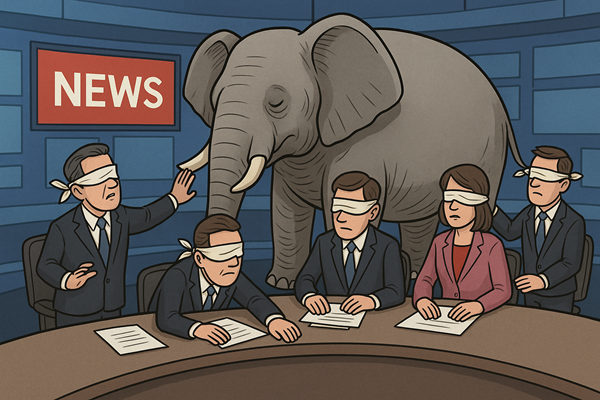.png)
Gurumurthy, ex-central banker and a Wharton alum, managed the rupee and forex reserves, government debt and played a key role in drafting India's Financial Stability Reports.
August 6, 2025 at 12:06 PM IST
Welcome to that sacred ritual known as Monetary Policy Day, a day when central bankers speak in tongues, markets pretend to listen, and everyone else scrambles to sound like they understood any of it. Like Deepaavali for economists, but with less joy and more jargon.
At the scheduled time the Monetary Policy Committee emerges from their sanctum sanctorum, robes fluttering, or is that just the air conditioning, to deliver what they describe as a “measured, data driven, forward looking, yet non committal” policy decision. The repo rate is adjusted by 0.00%, which is somehow described as both hawkish and dovish: “hawkish hold” if you are feeling spicy, “dovish pause” if contradictions appeal. No matter. There is a press release, a statement, a technical appendix and a vague hint about the “stance,” which, like a yoga pose, is always open to flexible interpretation.
But that is just the prelude. The real drama begins after the announcement.
Scene: a glitzy newsroom studio, 11:02 AM.
ANCHOR (all teeth and caffeine): “We are joined now by Dr Bhaktavatsala Iyer, macroeconomist and thought leader. Dr Iyer, your reaction to the RBI’s policy?”
DR IYER (blinking): “Well, honestly, I do not have any specific views at this moment.”
ANCHOR (visibly aghast, clutching earpiece): “But… but we have to run the show, doctor. We need opinions.”
Cut to commercial. Sponsored by RateShield. Because every pause deserves protection.
Back from the break, Dr Iyer is now compliant.
DR IYER: “Yes, I think this was a bold, cautious, balanced step that maintains liquidity without disturbing inflation expectations, while simultaneously preparing for growth headwinds in an increasingly multipolar geopolitical framework.”
ANCHOR (beaming): “Brilliant. Let us now go to Ms Kavita Shah for an alternate view.”
KAVITA SHAH: “Well, I agree with Dr Iyer.”
ANCHOR (trying to hide a grimace): “Yes… but can you disagree while agreeing?”
SHAH: “Of course. While I broadly agree, I think the MPC has underappreciated rural stress, overplayed core disinflation and failed to mention the monsoon 14 times. So yes, I agree… but strongly disagree with the way they agreed with themselves.”
ANCHOR: “Excellent. That is balance. Now let us turn to our market expert for how the equity markets are reading this decision.”
MARKET EXPERT (frantically scanning Sensex): “Markets are flat, which clearly shows that investors are both surprised and not surprised.”
ANCHOR: “Fascinating. So, a Schrödinger’s rally. Alive and dead at the same time.”
Meanwhile, op eds bloom across the internet like weeds in a neglected macro garden. Each titled some variation of:
- Pause for Thought: Why This Is a Turning Point
- No Change, Big Message: The Hidden Signals
- Monetary Policy: Nothing Happened, So Let’s (Over)Analyse It Anyway
Somewhere in the corner of the grid, a BasisPoint in-house columnist is reviewing footage to confirm whether the Governor’s glasses leaned marginally dovish. Early estimates suggest he blinked 13% more than last quarter. Five readers will be delighted. One will quote it on LinkedIn. No one will be wiser.
By 4 PM, a newsletter with the header Decoding the Undecoded lands in inboxes, complete with five charts, three bullet points and one line that says, “The RBI is expected to remain data dependent”… a revolutionary thought never before uttered.
On LinkedIn, amateur economists begin their slow migration to relevance.
“Interesting policy. Here is a 23-post thread on how this connects to the fall of the Roman Empire and long-duration bonds.”
Scene: 6 PM Panel Discussion, titled The Monetary Mosaic: Reading Between the Dots.
One panellist insists this is the beginning of a pivot. Another says it is too early to say pivot. A third says the word pivot itself is overrated and possibly colonial. The fourth panellist, whose screen is frozen, still wins the debate.
The anchor, now visibly exhausted, asks: “Final question. What would you do if you were the RBI Governor?”
There is silence.
Then, one brave soul whispers: “I would probably say nothing, wait for the US Fed… my bad… Trump…”
Thunderous applause.
And thus ends another Policy Day.
The RBI has paused, the markets have oscillated, and the pundits have prognosticated. No consensus was reached, but that is not the point. Opinions were aired, panels filled, graphics scrolled, and viewers dazed.
The curtain falls. Until next quarter, when the world once again gathers, not to understand, but to opine. Because remember, dear citizen: in the world of televised economics, it does not matter what you think. It matters that you think something. And preferably before the next ad break.




